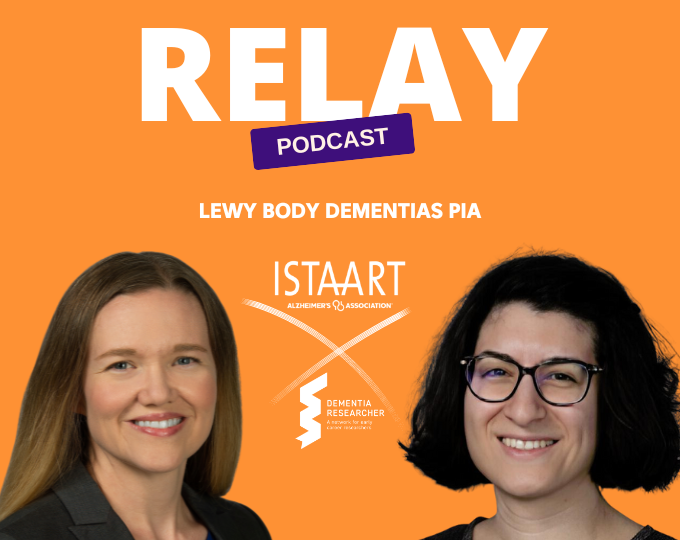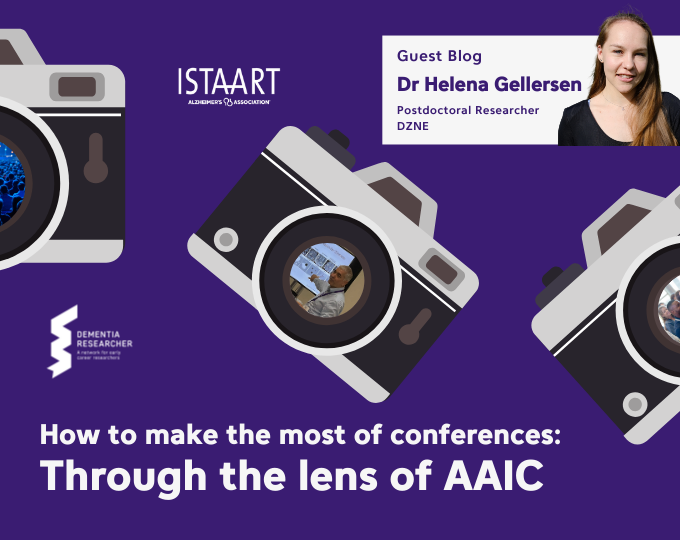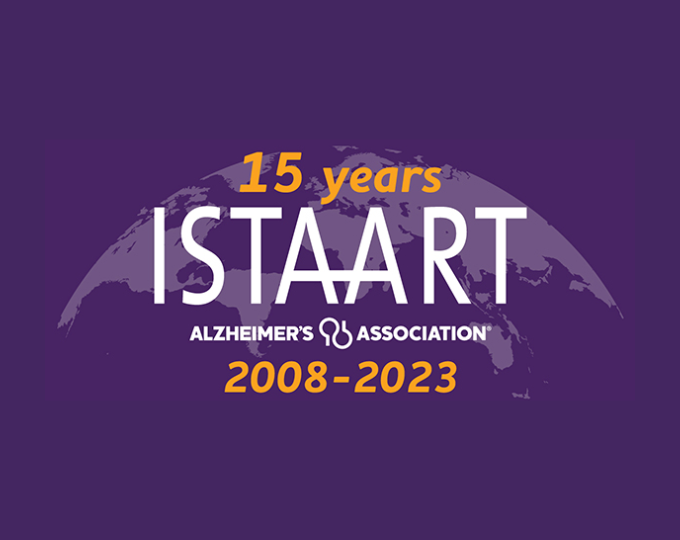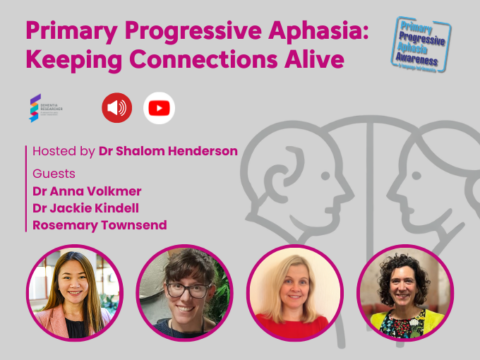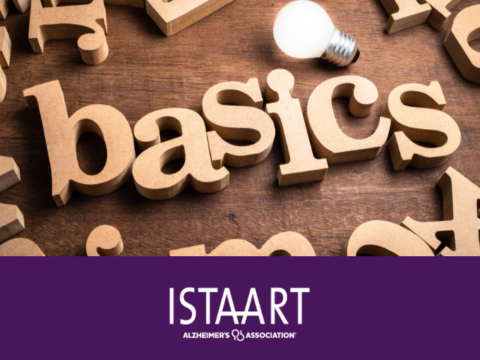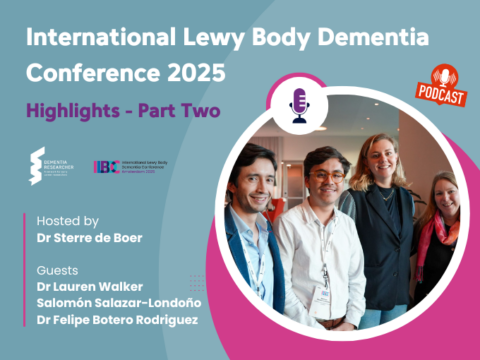Welcome to the fifth season of the ISTAART PIA Relay Podcast, brought to you by Dementia Researcher. In this six-part series, members of ISTAART professional interest areas (PIAs) take turns interviewing their colleagues about the latest research in Alzheimer's disease and other dementias. This episode features a Caitlyn Fastenau, a PhD candidate from the University of Texas Health Science Centre interviewing Dr Jessica Caldwell, a neuropsychologist and director of the Women’s Alzheimer’s Movement Prevention and Research Centre at Cleveland Clinic.
Dr Caldwell discusses her pioneering work at the world's only clinic designed specifically for women to reduce their Alzheimer's risk, focusing on sex and gender differences in the disease. She highlights the critical role of menopause, stress, and hormonal changes in Alzheimer's risk and shares insights into the importance of diverse research populations and the unique challenges faced by women caregivers.
Tune-in as explore hot topics of sex and gender differences in Alzheimer's research, including the impact of menopause, the need for gender-diverse studies, and the initiatives of the ISTAART Sex and Gender Differences in Alzheimer's Disease PIA and what they have planned for AAIC. Whether you're a researcher, clinician, or someone affected by Alzheimer's, this episode offers valuable perspectives on the intersections of gender, health, and dementia.
Voice Over:
Hello, and thank you for listening to the fifth season of the ISTAART PIA Relay podcast brought to you by Dementia Researcher. ISTAART is a professional society and part of the Alzheimer's Association representing scientists, physicians, and other dementia professionals active in researching and understanding the causes and treatments of Alzheimer's disease and other dementias. In this six-part series, we have members of ISTAART professional interest areas taking turns at interviewing their colleagues and being interviewed themselves, with the interviewee going on to be the next episodes' interviewer. We're sure you've listened before, so you know what to expect. We'll be releasing one of these podcasts each day in the buildup to the Alzheimer's Association International Conference, which this year takes place in Philadelphia. Through the series, we hope you'll learn more about some of the amazing research happening in different fields of discovery and about the great work taking place in the ISTAART PIAs. Thank you for listening.
Caitlyn Fastenau:
My name is Caitlyn Fastenau, and I'm a rising fifth year PhD candidate at the University of Texas Health Science Centre in San Antonio, and I work on the immunity and neurodegeneration PIA as the student representative. Today I'm really delighted to have a conversation with Jessica Caldwell.
Hi Jessica. Can we start by asking you to introduce yourself, which PIA you're involved with and how you like being involved with the ISTAART community?
Dr Jessica Caldwell:
I'm Jessica Caldwell, I'm a neuropsychologist and I direct the Women's Alzheimer's Movement Prevention and Research Centre at Cleveland Clinic. I am a representative here from the Sex and Gender PIA of ISTAART, and I really enjoy being a part of the ISTAART community. This has been something that has given me more connections with like-minded researchers, it's also allowed me to both get mentorship from folks who are further along in their career and given me a chance to mentor others who might be working on similar topics earlier in their careers.
Caitlyn Fastenau:
Awesome. So, I've never met Jessica, but I'm really intrigued by your job title, Women's Alzheimer's Clinic, and that very nicely ties in with sex and gender differences in our interest in PIAs. So, can you talk a little bit about what that actually means?
Dr Jessica Caldwell:
Sure. My research has always, for the past decade, focused on sex and gender in Alzheimer's disease. And on the clinical side, my job is to run the world's only clinic that's designed for women to come and reduce their risks for Alzheimer's disease. So, I meet with women from all over the country and help them to understand what factors play into risk for Alzheimer's disease in their life specifically, and then I help them to start making the changes and understanding where they can get started in a way that can help them to eat better, move better, sleep better for the long haul for life.
Caitlyn Fastenau:
Wow. As a woman in science and also with a family history of Alzheimer's disease, I am very thankful that there's a clinic now. It's not too far, well halfway across the States, but excited to learn more about that. Thanks for sharing. Kind of in a similar vein, can you talk about some of the hot topics in sex and gender differences? And I guess also from a neuropsychological perspective, if there's any tricks or tips that you'd recommend.
Dr Jessica Caldwell:
Sure. So right now, there are many hot topics in the field of sex and gender differences in Alzheimer's disease. I think one that I'm very happy to see coming to the forefront is the difference between sex and gender. I think many times when the average researcher or person in the public thinks about sex differences, they're thinking about hormones and chromosomes, which are sex differences, but less really recognised are the gender differences. So how does the way that women are expected to have a particular role in society, in culture, how does that impact their healthy behaviours that then may play into their risk? How does it impact their stress levels, which then play into their risk? So, I'm very heartened to see that this is getting a bit more attention.
I also know that a very hot topic right now is menopause. So, women, we go through menopause and at that time in midlife we have a fairly rapid loss of our oestrogen. Many people think about oestrogen in relationship to fertility, and it certainly has a big role in that. On the other hand, oestrogen and receptors are found throughout our body systems and throughout our brain. And in the brain, one of the things that oestrogen does is supports neuroplasticity and supports neuroprotection. So, losing that oestrogen at menopause has consequences for women's memory. One of the big questions at this point is how do we make sure that women who may be at risk for Alzheimer's disease don't experience menopause as an additional risk factor, and what should we do to potentially treat that or address that risk factor?
Caitlyn Fastenau:
That is honestly amazing to hear because we actually have a project going in our lab looking at perimenopause in mice. While it's not the same, obviously, we're really interested in how that impacts neuroinflammatory profiles in the brain and in women that undergo chronic stress. So, I think that could be a very nice tie in with a little bit of your experiences as well.
Dr Jessica Caldwell:
So glad you said that because it seems like we're running very similar studies, you in mice and me in humans. One of my primary studies right now is we are looking at how women's stress levels across the menopause transition as well as their decline in oestrogen across that time. If women are at risk for Alzheimer's, how do stress and oestrogen come together in midlife to maybe impact the way that inflammation comes up in our body, as well as the way that our brain works when we're trying to learn and remember things? And the reason for this is that we know that whole body inflammation really can help to promote brain inflammation, which in turn promotes a nice development of pathology. And then on the other hand, with the brain-based changes, if our brains are using an inefficient strategy, too much activation, in other words, when we're trying to learn and remember, that might help us in the short term, but in the long term, it actually may be detrimental.
Caitlyn Fastenau:
Yeah, absolutely. And I think another nice tie in with this conversation is that we often see in mice a difference in pathological burden in our different models of dimension, Alzheimer's, and we think some of it has to do potentially with the transgenic features of the mice models, but also sex differences and how important it is to balance studies to better understand the differences between sex, especially in our rodent and also obviously in our human experience.
Yeah, I guess I have a follow-up question in terms of your neuropsych background. I'm really passionate about diverse research populations, I work in brain banking, so I look at postmortem human tissue, we have a really big push to have representative populations to understand what's happening across the country. How, in your work and in the clinic that you work with, how do you guys try to manage diverse populations?
Dr Jessica Caldwell:
Such an important question. So, on the research side, I want to be clear that from a diversity perspective, I think sex and gender diversity is where I've started. So, ensuring that women and people with a uterus are represented in Alzheimer's disease research is absolutely critical. One other piece that I will say is when we think about gender, one piece that's very under researched is individuals who are on the gender spectrum, so individuals who are transgender, people who are non-binary on the sex spectrum. This is an area that really needs to be addressed, and our group is really trying to make headway and in connections in the LGBTQIA population locally to try to make that happen. From a research perspective as well, one thing that we learned on the sex and gender side is that women have better verbal memory, which means that oftentimes later in life, they may wind up getting diagnosed with Alzheimer's late if they do develop it because the tests for Alzheimer's disease oftentimes involve a verbal memory test.
But the downside to those studies that my group and others have done is that most of those studies were done in large groups of mostly non-Hispanic white women. And so right now what we're trying to do on the research side regarding going beyond non-Hispanic white cohorts is we're looking at the influence of race and ethnicity. My postdoctoral fellow, Dr. Taylor Levine, is looking at the sex differences in memory in a large multi-ethnic cohort, actually out of Texas, it's Dr. Sid O'Bryant's Habs-HD cohort, and really trying to see do the same findings show up in a multi-ethnic cohort in Black Americans, in Hispanic and Latino Americans, or is there a different pattern? It's critical to really look at this from a broad diversity perspective because we know what happens when you don't include women, you don't get the full picture.
And I think that is exactly the same thing, if we are too narrow and our studies just include primarily non-Hispanic white people, we're not going to find the answer. Then from a clinical perspective, this is also so critical to make sure that when I'm talking about reducing risks for Alzheimer's disease, that we offer those educational pieces and clinical services to everyone, especially because we know that Black women and Hispanic Latino women are at up to two times greater the risk compared to white women when it comes to Alzheimer's disease. So, if we are not offering clinical services to the people who are most at risk, I would say as a clinician, I'm not really doing my job. So, in addition to our work kind of reaching out to the LGBTQIA community, we also really have been for the last four years making inroads into the Hispanic, Latino, and Black American communities, really trying to show up, not just to recruit people, but to really form some relationships and make our presence more useful, I think, to folks in the community.
Caitlyn Fastenau:
I love that. I think we should all be champions of diversifying and having equitable access to our research and our research products. I think another awesome ... oh, sorry. I think another awesome contribution to this conversation is also having researchers that represent the populations that we're trying to target so that we are giving examples to our community members of the types of researchers that can build those important trust, those bonds, those connections, to further propagate the research and also to help community members. I think we can go a lot farther by building trust, so thanks for that, I love that. I have a follow question, but it's a little more related to your PIA experiences, how long have you been involved with the sex and gender differences PIA, and then tell me a little bit about how the PIA supports your research or supports your career development.
Dr Jessica Caldwell:
So, the Sex and Gender PIA was formed in 2020, and I have been involved as a member of the PIA since that time, and then over the last year I've joined the executive committee as a steering member. And this PIA really, I think is a huge supporter of career in general, so creating opportunities for folks who are at various levels of their career to meet with others who are interested in similar topics, to collaborate, or just to kind of informally mentor. We also do have a student and postdoc poster award, and we have a paper of the year award, which I think give opportunities for folks at different stages of career to really gain a little bit more visibility in what can be a really intimidating conference at AAIC. So, I think that, for my career personally, just being able to be on the executive committee and learn from folks who have more experience working on these types of committees as well as just to learn from the group as a whole, including our early career representative, how we can lift this field up and how we can best help to promote each other.
Caitlyn Fastenau:
Yeah, absolutely. I think as an early career representative on our PIA, it's really nice to feel like you can have authentic conversations with faculty members that are obviously in different career stages and feel that that is an open door to allow conversation, to allow ideas for activities or different seminars, I think it's an invaluable experience for trainees. So, I would definitely plug that if you're interested, definitely check out the training options, and also join PIAs because it's really great networking, activities, seminars, webinars, it's great.
Dr Jessica Caldwell:
Absolutely.
Caitlyn Fastenau:
I do have a question though. I might be a little novice, but what is a steering committee member in terms of ... yeah, what is that?
Dr Jessica Caldwell:
So as a steering committee member, I participate in all of the executive committee meetings. I don't have a role like our programmes chair or our communications chair or the chair or vice chair of the meeting, but I am there as an expert in the field with my particular knowledge. Everyone on the committee contributes to every discussion, so if it's about programmes or communications or high-level planning, I'm there contributing as are the other steering members. So, while I don't have a formal task, I am there to support the PIA and I am running different initiatives that maybe couldn't be run if we didn't have a full set of steering members, there are four of us.
Caitlyn Fastenau:
Can you give us an example of one of your favourite activities or events that have been hosted in your PIA?
Dr Jessica Caldwell:
Yes. So, the Sex and Gender PIA has become famous in our small circle for our debates at AAIC PIA day, and we will be hopefully not disappointing, I'd encourage everyone to come to PIA Day this year on Saturday the 27th, we're at 1:30 to 2:30 PM and I love being a part of these debates. We try to pick a topic that is a hot topic in the field, but we also try to have fun with it because what we want to do is not to discourage anyone from either side, but really to kind of boost both sides and also help people to engage in a way that's less intimidating again, and I think our current and past chairs have just done a phenomenal job of picking speakers and on being entertaining at a level that I personally find very impressive.
Caitlyn Fastenau:
I have been to, I think, three of them now, and each one is always, it's the hottest one of the day, even though all the other PIAs have great activities, I have to say sex and gender always brings it home in a really fun and somewhat musical way.
Dr Jessica Caldwell:
Yeah. I won't say too much, but we will not disagree.
Caitlyn Fastenau:
Sure. Wonderful. I am looking forward to it. Are there any other sessions at AAIC that your PIA is contributing to?
Dr Jessica Caldwell:
Yes. So, this year we have a number of PIA members that will be presenting across the conference. So, you'll see PIA members within sessions on sex differences, within sections on sex and gender, and I also will be presenting at a session that's on risk and resilience and mechanisms of risk, so there's going to be so much great stuff out there. I really encourage folks to look out for the sex and gender sessions and also to look out for posters on sex and gender as well as if there are early career folks or students that listen to this podcast, seek us out, we're happy to have you, we want you in the PIA, and we also want to see your posters, so please come approach us.
Caitlyn Fastenau:
Definitely. I've actually had several students when I was presenting at AAIC last year and the year before that ask me how to get involved in PIAs, and then often there can be a barrier to access, not of signing up, but how do I ask questions if I'm a very early career scientist? I've even had people ask me, "Well, what if I do more basic research and this PIA is maybe more translatable or more related to clinical work? How do I put my input or even learn from them?" Can you maybe give any insights for an early career scientist that might have this question?
Dr Jessica Caldwell:
Yes. The one thing I want to make sure folks know is that to join ISTAART is free if you're a student. And so then to join the PIAs is also free, and those, once you're an ISTAART, you're open to all of them. And so even before you think about a specific PIA, just know that there are many across the board. So, there are PIAs focused more on basic science, there are PIAs focused more on a clinical realm, and there are PIAs like sex and gender where we have both. So, I honestly think that's one of the best things about this PIA is that it brings together people who maybe otherwise wouldn't listen to the same talks or sit at the same table, we have the full spectrum of folks who work on the cellular molecular level all the way up to in the clinic, and that's their main space.
So, I would encourage people to not be afraid if the PIA title seems to be more clinical or more basic, that doesn't necessarily represent the total membership. And then on the other side, again, just I think AAIC is an incredible way to engage. So, beyond the Sex and Gender PIA, there are other PIAs that host mentoring breakfast, that host nighttime panels. Even if you'd think this isn't quite my PIA, this is a really great time to get FaceTime, to ask questions, and to really figure out how the PIAs best work for you can.
Caitlyn Fastenau:
Yes, I would agree. I attended the ... I don't know the exact title, but it was like a women in science or women in peer mentoring. Yeah, aware, the breakfast, that was excellent because it was an opportunity to talk one-on-one with scientists that I probably would not have had that opportunity.
Dr Jessica Caldwell:
Exactly. And sometimes that's the best opportunity at the whole conference to really have a sustained conversation with someone. You may not get as much time at your poster, you may not get as much time if you ask a question after a talk. So, I mean, I would say it's an opportunity that's different, take advantage.
Caitlyn Fastenau:
Yeah. And I would say even from my personal experiences, if you're interested in broadening your research experiences, while you might work in one field, but your interests may lead you to a postdoc opportunity in another, it's great to build those connections in a very inclusive community that AAIC fosters. I guess my follow-up question to that is have you had experiences in other scientific societies in your career, and how might those experiences differ from your experiences with the Alzheimer's Association and ISTAART?
Dr Jessica Caldwell:
Sure. So, I'm an active member of the International Neuropsychological Society as well as some other societies focused on brain imaging. And I would say that AAIC, as you've mentioned, it stands out as a very friendly, inclusive, encouraging community. I really enjoy the interactions I have at AAIC, not to say that I don't at other conferences, but what I like about this conference is its topic focused. So when I go to my INS conferences, really I'm looking at neuropsych focused issues and really learning in depth at a field level, but I might be learning about different topics or might not be able to have the depth of Alzheimer's related knowledge, whereas at AAIC I know everything is related to the topic, the high level topic that I'm interested in, and I get to go in depth instead on the methods, and I get to really kind of collect different sorts of knowledge that I wouldn't go to, for example, a basic science conference, but I can get the knowledge that I want or the peek into that area, so that's why I find really valuable.
Caitlyn Fastenau:
Yeah, I think I would echo a very similar sentiment, although ISTAART Alzheimer's Association is such a large organisation, I really feel that you can build those niches where you can build a personal connection with other scientists, other students, and ask those pressing questions like how do I get a successful grant? Or how do I get on publications? I think I would plug other intermission and lunchtime sessions for students. I found those last year to be very invaluable in learning how to do science communication from a written perspective, or how do you discuss manuscript authorship, that can be a really divisive topic in some areas. So, I think it's nice to have a society that supports those investigatory questions, especially as a student, so I agree. I think I would circle back a little bit to some of your background in terms of what has driven your focus into neuropsychological research in the dementia perspective and maybe any personal reasons why you've been really impassioned about this research.
Dr Jessica Caldwell:
So, I came to this field in a slightly unusual way. So, I got my PhD in clinical psychology, but I was very focused in brain imaging, and it turns out I was looking at sex differences, but in adolescent behaviour. At the same time, I was doing my clinical training and primarily was working with folks with memory disorders. And so, I had these two separate interests and passions for quite a long time. And then I came to Las Vegas and started to look at sex differences in Alzheimer's disease, and it really was because of The Women's Alzheimer's Movement. I had an opportunity to get a philanthropic grant from them, which helped me to really kind of build some data, and then I was fortunate to get an R01 grant, and now I'm building my grant portfolio on that topic. And the reason why I am passionate about this topic is because as a woman, I think that we women, we need representation as scientists, and we need representation as research participants and question askers.
I think that one of the big reasons why we're just now looking at menopause is that some of the researchers decades ago, maybe as men kind of dominated the field, wouldn't even have known to ask that question based on life experience. And I think that this is also true if we think about a diverse perspective, there are certainly questions that I as a white woman don't even know to ask. And so, I really am passionate about being part of that change in the field where we start to ask different questions, investigate different roads, and really lift each other up on that.
Caitlyn Fastenau:
Yeah, I think I would absolutely echo the same sentiment. I did a little bit of neuropsychological testing in my undergrad looking at episodic memory in bilingual individuals, so looking at language as a cognitive scaffold for memory. And what I found in our research as a community participants, we actually had a very difficult time recruiting male participants because, on average, women appear to be more interested in self participation in certain community-based studies. So, I would often talk to our participants and say, "Hey, do you have a brother? Do you have an uncle? Do you have a husband that would be interested?" But that kind of hones into the beauty of having women with really excellent verbal communication and executive function to organise themselves into different studies, but then it kind of furthers to we need to reach out to those who may not have those opportunities and build a community that allows understanding of both sides.
So, I think, yeah, I really appreciate you sharing that. I attended a conference recently in Texas, it's the Texas Alzheimer's Research Care and Consortium, and essentially, we talked about women burdening the caregiver role in a lot of dementia research and that chronic stress as a caregiver actually can propagate memory decline on the later end. So, I think that was such an intriguing idea that both caregiving and sex and gender differences play a key role in fighting and caregiving for Alzheimer's disease.
Dr Jessica Caldwell:
Absolutely correct. And another thing that happens with women at midlife is that women aren't just two thirds of current dementia caregivers, those same women caring for parents with Alzheimer's disease have small children at home, and so these are women of the sandwich generation and they're experiencing a double caregiving potential burden, potential stress that's unique to them for the most part, and also unique to that time of life.
Caitlyn Fastenau:
Yeah, absolutely. Often the question that I get, and I don't study sex and gender differences, is why are the population of patients with Alzheimer's so skewed toward female? Or why are there more female patients? There's not an easy answer, but is there some ideas around that?
Dr Jessica Caldwell:
Up to even a few years ago, the primary thought around sex and gender differences was that women live longer than men on average, and ageing is the number one risk factor for Alzheimer's, so that just explains sex differences. At this point we know that that's not true, there are many other factors that come into play. Some of the factors are things that only impact women or people with a uterus. So, for example, menopause, like we talked about earlier, menopause may be a critical risk for some women.
On the other hand, there are some risks that happen pretty equally in men and women but seem to impact women more than men when they're present. One example of that is that when a woman has the most common risk gene for late onset Alzheimer's, the APOE4 allele, some studies have shown that that woman is up to four times more likely than a man with the same allele to go on to get Alzheimer's disease. Finally, there are some risk factors that just are more common in women. A great example of this is that women are oftentimes less physically active than men on average, in the US anyway, and not being active is a risk factor for Alzheimer's disease, so we're just more likely to experience that risk factor.
Caitlyn Fastenau:
There was a session last year on physical exercise, and there were definitely some key differences in gender in those types of exercises, so I think that's something I hadn't really thought of sedentary. Now, as a grad student, I am pretty sedentary, so maybe I need to focus on that in my early life, but I really appreciate you letting me pick your brain about some of these topics. As a more molecular scientist, I don't often get to do that. My follow-up question is how potentially pregnancy may play a role in risk factors for dementia, so women or gender differences in pregnancy.
Dr Jessica Caldwell:
I'm glad you're asking about this as well, because while we talk a lot about menopause as a potential hormone-based risk factor for Alzheimer's disease and dementia, that's not the only important hormone transition that women and people with a uterus experience. So, pregnancy and puberty are also critical hormonal transition times that revolve around largely oestrogen, progesterone, other sex hormones, and there is a lot of research right now focused on all three of those transition points. For example, there is some work that suggests that women who have a longer fertility period, so a longer time between menarche and menopause may have some protection against dementia. There also are studies on pregnancy, looking at how many pregnancies a woman has had or whether or not she has ever had a pregnancy, which may also play into risk or resilience for dementia. That's not my particular field, but I think it's important to know that menopause is not the only hormonal transition we need to think about.
Caitlyn Fastenau:
Wow, awesome. Yeah, that was really helpful. I think people have asked me that question in the past, and I'm really grateful to have a really great field of researchers answering that question much better than I can understand, but I think it helps me get a better perspective on the different hormonal changes that might risk, provide some risk, but also maybe provide some reward in certain fields. So, I think with that, our time has come to an end for today's podcast, but I really want to thank you for participating in this very intriguing discussion that we've had.
I want to thank everyone for listening today. You can find profiles on myself and our brilliant guest, and information on how to become involved in ISTAART on our website at dementiaresearcher.nihr.ac.uk, and also at www.alzorg/istaart. There's a link in the show notes. I'm Caitlyn Fastenau, and you've been listening to the Relay Podcast from Dementia Researcher and the Alzheimer's Association. Hit subscribe on YouTube and in your favourite podcast app to ensure you won't miss an episode. Thank you.
Voice Over:
The Dementia Researcher Podcast was brought to you by University College London with generous funding from the UK National Institute for Health Research, Alzheimer's Research UK, Alzheimer's Society, Alzheimer's Association, and Race Against Dementia. Please subscribe, leave us a review, and register on our website for full access to all our great resources. Dementiaresearcher.nihr.ac.uk.
END
Enjoyed the podcast? Please review, like, and share - and don't forget to subscribe to ensure you never miss an episode.
If you would like to share your own experiences or discuss your research in a blog or on a podcast, drop us a line to dementiaresearcher@ucl.ac.uk
Did you know... you can find our podcast in your favourite podcast app on mobile devices, and our narrated blogs are also available as a podcast.
This podcast is brought to you in association with the Alzheimer's Association, Alzheimer's Research UK, Race Against Dementia and Alzheimer's Society, who we thank for their ongoing support.
The views and opinions expressed by the host and guests in this podcast represent those of the guests and do not necessarily reflect those of UCL or Dementia Researcher

 Print This Post
Print This Post


